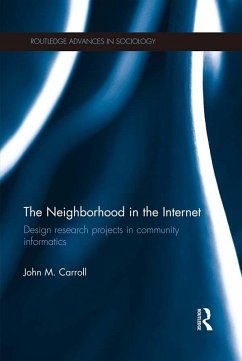The Neighborhood in the Internet investigates social and civic effects of community networks on local community, and how community network designs are appropriated and extended by community members. Carroll uses his conceptual model of "community" to re-examine the Blacksburg Electronic Village - the first Web-based community network - applying it to attempts to sustain and enrich contemporary communities through information technology. The book provides an analysis of the role of community in contemporary paradigms for work and other activity mediated by the Internet.
Dieser Download kann aus rechtlichen Gründen nur mit Rechnungsadresse in A, B, BG, CY, CZ, D, DK, EW, E, FIN, F, GR, HR, H, IRL, I, LT, L, LR, M, NL, PL, P, R, S, SLO, SK ausgeliefert werden.


